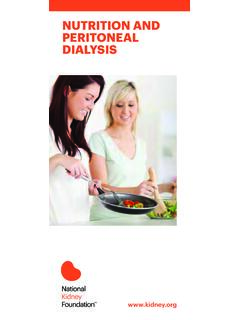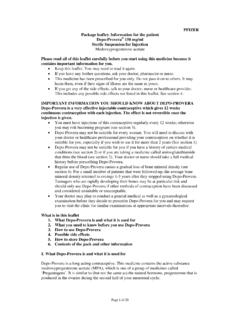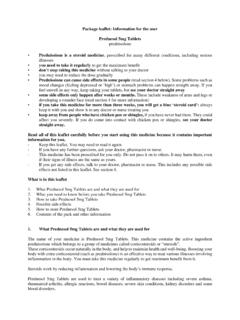Transcription of IF YOU CHOOSE NOT TO START DIALYSIS TREATMENT
1 YOU CHOOSE NOT TO START DIALYSIS TREATMENTNATIONAL KIDNEY FOUNDATION2 For many people with kidney failure, DIALYSIS helps them live longer and improves their quality of life. But for some people, the improvement they feel may be a lot more limited often because of their serious health problems. It is important to know that in such a situation, you have the right to decide not to START DIALYSIS . before making a decision, however, you should discuss your thoughts carefully with people you trust and seek advice from your doctor or other healthcare provider, family member(s), your lawyer or others who have your best interests at heart. This booklet has been written to answer some general questions you may have about the choice not to START I really decide not to START DIALYSIS TREATMENT ?Ye s. You have the right to decide not to START DIALYSIS if you feel that the burdens outweigh the benefits to you.
2 If you are not able to make this kind of decision, someone (such as a family member, lawyer, etc.) can make this decision on your behalf. The person you name to make such decisions is called your surrogate. (See next question.) do I go about naming someone to be my surrogate?A surrogate is someone you CHOOSE to make decisions for you if you are not able to make them yourself. Naming a surrogate is done by filling out a form known as an advance directive, a healthcare proxy, or a durable healthcare power of attorney. It is important to make sure the person you name is willing to act on your behalf. It is also very important that you tell the person about your wishes and values so that he or she can make the decisions you would make if you were not able to speak for yourself. It will be helpful to your surrogate if you give clear directions on your advance directive form about DIALYSIS and/or other medical treatments you would want or not KIDNEY FOUNDATION4 The role and responsibilities of the surrogate, as well as the types of decisions the surrogate may make, vary from state to state, depending on the laws of each state.
3 Generally, the surrogate must follow your wishes. For more information about naming a surrogate and about the laws in your state, you may want to speak with an attorney or your local or state bar association. You may also obtain copies of the forms used in your state by calling or writing to the: National Hospice and Palliative Care Organization, 1731 King Street, Suite 100, Alexandria, VA, 22314; phone: or ; (Also see the National Kidney Foundation booklet Advance Directives: A Guide for Patients and Their Families.)Will my doctor help me decide whether to START TREATMENT ?Ye s. Your doctor will speak with you about what DIALYSIS TREATMENT involves and what deciding not to START DIALYSIS would mean for you. While you try to make this decision, you may also want to get advice from people who provide emotional support to you and your loved ones and other trained professionals, such as your social However, the final decision about starting or not starting TREATMENT remains with you or your I am not sure whether DIALYSIS could help me?
4 Sometimes it may not be clear whether the benefits of DIALYSIS outweigh the burdens. Each person s situation is different. If you are uncertain, you may be able to START TREATMENT for a trial period for example, one to three months. During and after the trial period, your doctor and the other members of your DIALYSIS team will talk with you about how you are feeling and coping with the TREATMENT routine. Ask as many questions as you need to help with your decision to continue or to stop do I discuss this decision with my family and friends?Many people find it difficult to talk about whether or not to START TREATMENT , and they worry about how others will feel and react. Although you may find it hard at first, the best approach is to discuss your feelings openly with your loved ones. Your family will most likely feel very emotional too, and may have questions.
5 You may wish to include, other people NATIONAL KIDNEY FOUNDATION6in this discussion whose advice you value, such as your religious or spiritual advisor, social worker, doctor or other healthcare I be asked to speak to a mental health professional?If your doctor is concerned that you may not want to START DIALYSIS for an emotional reason, such as depression, he or she may ask you to speak with a psychiatrist, social worker or other counseling professional. Depression may be treated successfully with counseling, medicine or a combination of both. Your doctor may also want you to speak with a mental health professional to make sure you understand the full impact of choosing not to START long will I live if I CHOOSE not to START DIALYSIS ?There is no certain answer to this question. It varies, because everybody is different. Each person s medical status is unique.
6 People with kidney failure may survive days to weeks without DIALYSIS , depending on the amount of kidney function they have, how severe their symptoms are, and their overall medical death from kidney failure painful?Not usually. If you do feel any discomfort, pain medication may be prescribed for you. Without TREATMENT for kidney failure, toxins, and fluid will build up in your body, making you feel increasingly tired, nauseous and itchy. These symptoms can be controlled with medication and other supportive measures to make you more comfortable and lessen your anxiety. The fluid build-up can make it more difficult for you to breathe. Your doctor can prescribe medication or a TREATMENT called ultrafiltration to remove fluid and make breathing easier for you. Your doctor may also recommend that you limit your intake of salt and fluids to reduce fluid weight deciding not to START DIALYSIS considered suicide?
7 Many religions believe people have the right to refuse medical TREATMENT , including DIALYSIS , if they feel it will not help them and will be burdensome. You may wish to speak with your religious or spiritual advisor if you have concerns about KIDNEY FOUNDATION8 What type of food and drink could I have?Typically, there is no reason for you to continue to follow your kidney diet once you CHOOSE end-of-life care. In fact, favorite foods and beverages are usually encouraged. Your doctor, nurse, and dietitian can answer other specific questions you may have about food and fluid I make this decision, will my doctor continue to help me?Ye s. Your doctor should be available to you and your family to discuss your concerns and advise you about the type of care you might need. Your doctor should work with members of your healthcare team to arrange the necessary referrals or consultations for your circumstances.
8 Other professionals, such as the social worker or nurse who has been part of your healthcare team should also remain available to I have a choice of where I die?Your wishes about where you want to die will be honored as much as possible. Many people CHOOSE to die at home, where they feel more comfortable in familiar surroundings. If you CHOOSE this option, a hospice home health agency may assist you and your loved ones in making any special arrangements for your care at home. A nursing home may be an option for some people. Admission to the hospital may not be a consideration, depending on your insurance coverage and overall medical I get hospice care?If you CHOOSE not to START DIALYSIS , you require end-of-life care and you are eligible for hospice services. The type of hospice care available may be either a home hospice program or a hospice facility.
9 A social worker, a visiting nurse service or home care agency may be able to help you and your loved ones make arrangements for hospice care. Hospice services usually include some visits from a nurse, a home health aid, and a social more information about hospice programs in your community, speak with your doctor, nurse or social worker. You may also be able to get information from your religious community, or from friends and neighbors who have had experience with hospice care. If you are a senior citizen, you can contact a local senior NATIONAL KIDNEY FOUNDATION10center or the local or state Office on Aging. Also check your local yellow pages and Internet resources such as I CHOOSE to die at home, can I get a home healthcare worker to help my family care for me?The types of services covered at home will depend on your insurance.
10 If you are in a home hospice program, a home health aide may be available to assist. If your insurance does not cover a home health aide, and you and your loved ones wish to pay privately for these services, you can do so. There may also be government programs to help with costs. Ask your doctor, social worker, and community or government agencies about available and affordable home I still be covered by Medicare and/or my private medical insurance if I stop TREATMENT ?Your Medicare coverage will not end, even if you decide to stop DIALYSIS . It is important that you and your family speak with your doctor about the type of care you will need. Once this is decided, you can check on whether or not Medicare and/or private insurance will cover this I change my mind, can I go back on DIALYSIS ?You may START or return to DIALYSIS if you change your mind.












